
Features
A good time for change claims BC premier at COFI convention
Predictions, warnings and opportunities as COFI members return in person for 2022 convention.
May 3, 2022 By Adam Kveton
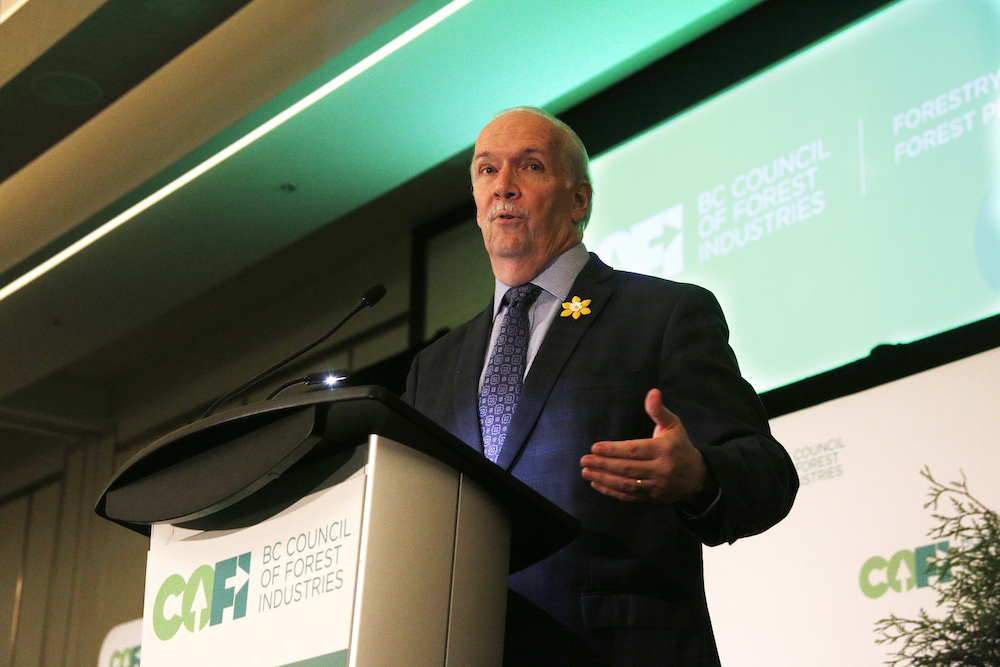 B.C. Premier John Horgan closes out the 2022 COFI convention by providing some context for his government's actions with regards to new forestry policies. Photo by Adam Kveton.
B.C. Premier John Horgan closes out the 2022 COFI convention by providing some context for his government's actions with regards to new forestry policies. Photo by Adam Kveton. There was a good deal of energy, relief and excitement in the air at the BC Council of Forest Industries’ (COFI) 2022 convention, which saw nearly 800 COFI members attend in person at Vancouver’s JW Marriott Parq Conference Centre last week.
Convention space and tables were packed with folks shaking hands with people they were meeting in the flesh for the first time in years.
This excitement was tempered by talks of Russia’s illegal invasion of Ukraine, the increased cost of traditional fuels, B.C.’s transformation into a high-cost forest products producer and the battle for public support of the industry.
But emerging from the gloom came reminders of the good the forest industry has done and continues to do for B.C. and Canada, optimism and a sense of empowerment from Indigenous speakers, and an understanding that B.C.’s forest industry can be an answer to climate change and a leader on reconciliation.
This all in the midst of high prices for lumber, leading many to decry the lost opportunity due to the provincial government stepping in with broad changes to policy and old-growth deferrals. However, B.C.’s Premier, John Horgan, weighed in with a different perspective, saying high prices would buoy the industry while a new reality is hammered out between government, industry, Indigenous peoples, rural communities and a mistrustful urban population.
A strong sisterhood
COFI’s speaker’s program began in earnest with Katrine Conroy under her more succinct title as B.C.’s Minister of Forests, who noted it was likely a first that her position and COFI’s CEO and president are both women. “I think it shows the number of women in the industry who work. You wouldn’t have seen that 20 years ago, or even 10 years ago maybe,” she said.
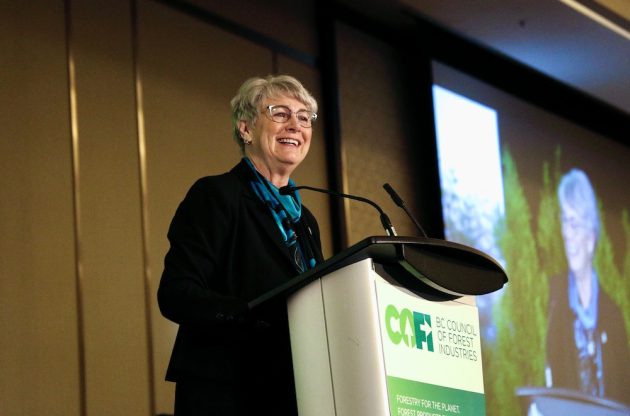
B.C.’s Minister of Forests Katrine Conroy speaks to a packed room of attendees at COFI’s 2022 convention on April 28. Photo by Adam Kveton.
During her speech emphasizing the need to conserve forests and forestry for the next generation, Conroy announced an increase to revenue sharing with First Nations to between eight and 10 per cent, with an additional three per cent share from BC Timber Sales revenue as well. This, she said, would result in an increase of forestry revenue share to First Nations of around $63 million this year alone. However, this is an interim announcement, said Conroy, with work to establish new practices under UNDRIP ongoing.
The “sisterhood” as COFI’s CEO and president Susan Yurkovich and others called it, was further on display with CN’s brand new CEO, Tracy Robinson, making her first public address at COFI.
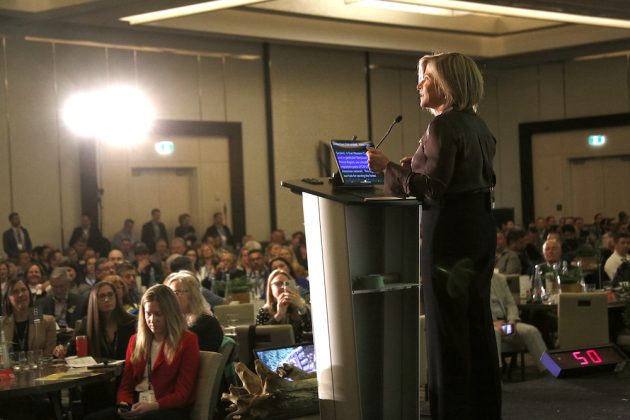
CN’s new president and CEO Tracy Robinson makes her first public address in her new role at COFI’s 202 convention on April 28. Photo by Adam Kveton.
She acknowledged that the forest industry has felt CN has been “less than a dependable transportation partner” recently. She emphasized the necessity of the industry’s and CN’s partnership, noted the $1 billion CN has spent in B.C. over the past several years to address capacity and harden infrastructure, and pledged to do better for the industry. But she asked for collaboration, communication and regular planning sessions so that CN can better adapt to turbulent trade flows.
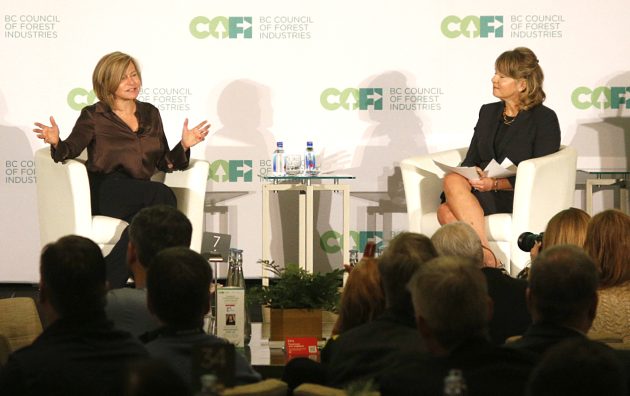
CN’s new president and CEO Tracy (L) responds to questions alongside COFI’s outgoing president and CEO Susan Yurkovich. Photo by Adam Kveton.
Predictions in an unpredictable world
The convention’s Thursday program felt full of global considerations and shaky predictions that most economists and advisors noted were likely to change.
“‘God created economic forecasters to make astrologers look wise’,” quoted Jock Finlayson, senior policy analyst at the Business Council of British Columbia and COFI crowd-favourite.
Considerations included China’s zero-tolerance for COVID-19 with continued lockdowns in major cities, climate change, continued supply chain issues and most notably Russia’s war in Ukraine.
Whether China would move to consume all the goods Russia was selling to Europe, including lumber, was one possibility, with Eurasia Group’s special advisor on energy, climate and resources, Robert Johnston weighing in.
“That’s just not true,” he said. “[China] will be very selective and opportunistic. And if it makes sense to them to take more Russian forest products, they probably will.” However, he doubted China would want to be too dependent on Russian supply when sanctions are likely to complicate shipping and insurance for those products.

Eurasia Group’s special advisor on energy, climate and resources, Robert Johnston (L), answers crowd questions put to him by COFI’s outgoing president and CEO Susan Yurkovich. Photo by Adam Kveton.
Whether Europe and the western world would pull back on the energy transition in the midst of soaring prices and uncertainty over the supply of oil and natural gas was another question. Johnston conceded the transition will be inflationary but that it would continue. He said Canada should be sending oil and gas to Europe, but said a major opportunity for forestry is biofuel, noting there is lots of available capital for innovative projects, and not enough projects. “There is probably more opportunity than risk overall,” he said.
Finlayson lamented the increased cost of business created by government regulation at the federal and provincial levels, noting the cooling effect this has on investment in Canada and B.C.
He described a Canada that is supporting its economy with high immigration, but which is weakened by an increase in household debt and low productivity, with not enough investment in machinery, technology and intellectual property that can bring increased productivity.
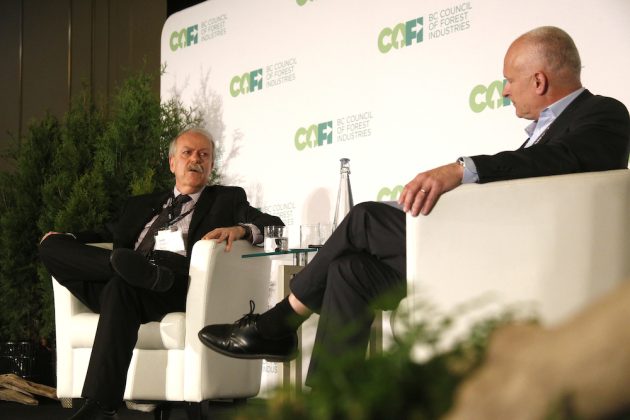
COFI crowd favourite, Jock Finlayson with the Business Council of British Columbia responds to questions put to him by West Fraser vice-president, James Gorman. Photo by Adam Kveton.
He added that he feels governments have lost sight of the fact that natural resources industries are at the core of B.C.’s and Canada’s economic prosperity, and pushed for a smarter regulatory environment.
Inflation featured in Finlayson’s presentation, as it did in Forest Economic Advisor’s (FEA) principal on lumber, Paul Jannke’s. “We’re looking at about seven per cent inflation in the U.S. on average for 2022/2023,” he said.
The Bank of Canada will look to be aggressive on interest rates, increasing mortgage rates up to six per cent, he said.
Tougher times could be coming, he said, with recession a possibility, and a slow-down predicted at the beginning of 2023, possibly later.
But Jannke pointed to opportunities to ship wood to Europe and to countries like Japan, while China looks to get cheaper supply from Russia.
Noting predictions are particularly difficult right now, Jannke said FEA predicts sanctions on Russia may remain through 2023, leading to a longer-term change in trade dynamics.
From the feds and B.C. to NATO and China
Harjit Sajjan, Minister for International Development, spent time assuring COFI members that pushing for a resolution to the longstanding softwood lumber trade dispute with the U.S. remains top of mind, and that work on that file continues.
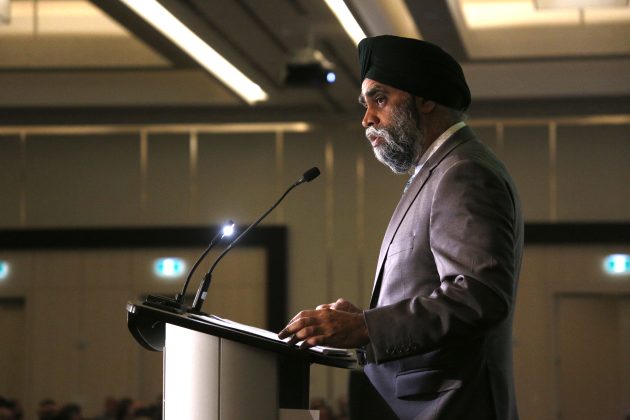
Canada’s Minister of International Development, Harjit Sajjan, addresses the crowd at COFI’s 2022 convention. Photo by Adam Kveton.
He also spoke on the uses of PacifiCan (Pacific Economic Development Canada) and its expansion, which will have a core annual budget of $110 million to help support B.C. industries, including forestry, with a goal of bringing investment to the province and directing businesses to programs and supports.
Insight into what China is learning from Russia’s war in Ukraine was provided by Dr. Wenran Jiang, president of Canada-China Energy & Environment Forum.
“Is China going to be the next Russia vis-à-vis Taiwan?” he said is the question on many people’s minds. “The Chinese are into this conspiracy theory … that NATO wants to use Ukraine to fight a proxy war against Russia, and then they want to do the same in Asia using Taiwan to take on China.”
While laying out various possibilities for how Canada could handle China, Dr. Jiang ultimately recommended the best way forward would be to resume trade with China and move past the two Michael’s incident, noting that industry should use their democratic powers to urge government down this path.
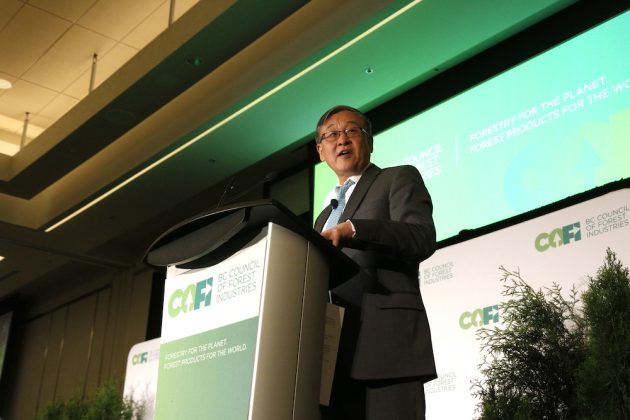
Dr. Wenran Jiang with the Canada-China Energy & Environment Forum shares his insights on China. Photo by Adam Kveton.
Looking up
After a somewhat gloomy morning came the convention’s first three-person panel, with the Sustainable Forestry Initiative’s (SFI) president and CEO, Kathy Abusow, talking up the benefits of a properly managed forests where industry operates, biodiversity is maintained and the public understands how that is accomplished.
“I think that society understands that forests are a solution (to climate change) but I think they only think of forests as a solution as something that is untouched … they think somehow that touching these forests … they are going to undermine the benefits that actually come from sustainable use and sustainable harvesting,” she said while pushing for greater forest literacy.
Adera Development’s COO and mass timber lead, Rocky Sethi, described the benefits of mass timber construction, boasting 30 per cent faster build times than with traditional wood frame building, off-site creation of wall panels, roof panels and more, fewer workers needed on-site, and a plan to double their company’s own commitment to building mass-timber homes. “The reason behind it is it’s working. We’re getting traction with customers,” he said.
Paper Excellence’s vice-presdient Graham Kissack said a positive forestry story to tell is his company’s move into producing renewable food packaging. He described the forest industry’s trend towards greater utilization, and how a potential moratorium on slash burning and escalating fibre prices, while difficult, are helping to drive that.
“Paper Excellence, we are down 66 per cent since 1990 baseline,” as far as carbon reductions, he said – a consequence of fuel switching and greater efficiency.
All three pledged to remain focused on climate solutions, despite the ramifications of current global realities discussed that morning.
Three CEOS
The final panel of the day came with an emphasis on where supply chain issues began, what successful partnerships with First Nations look like, and a question on investing in B.C.
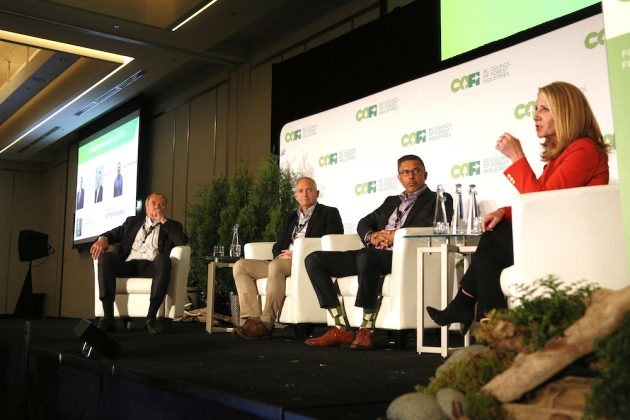
(From Left) Don Kayne, president and CEO for Canfor, Ray Ferris, president and CEO for West Fraser, John Mohammed, president and owner of A&A Trading take questions from Bridgitte Anderson, president and CEO of the Greater Vancouver Board of Trade. Photo by Adam Kveton.
West Fraser’s president and CEO, Ray Ferris, contended that supply chain issues were not borne out of COVID-19, but from “a long-term, steady erosion of our capacity… right across North America.”
“We are absolutely dependent on rail,” he said, as more trucks are not being added.
He said a major commitment will be required if we hope to grow the economy via export. “I think it’s the biggest crisis that we have in British Columbia that really isn’t getting any air time.”
A&A Trading Ltd.’s owner and president, John Mohammed described what the key factors have been for his business when partnering with First Nations while working on traditional territory.
A respect for what a particular First Nation values is one key, with different Nations focusing on different things. While some may look to maximize profit, quite often the focus is on things like sustainability, cultural values, employment opportunities, training or habitat restoration.
Having respect and flexibility around a Nation’s timelines is also important, he said. He recalled one project where he was striving to get work done by the end of the year, and the First Nation’s Chief assured him, “‘we’ve been here for 10,000 years – one year is not going to matter.’”
Finally, he said transparency and open communication are essential. “It’s so important that we are letting our partners know exactly what is going on on the land base.”
A question was asked on investing in B.C., and Canfor’s president and CEO Don Kayne weighed in. “We’ve got some of the best quality fibre in the world, we care about B.C. … we can see what’s being accomplished in other jurisdictions … in Europe, we see it in the U.S. South, and we know we can be better. Never mind as good – better,” he said.
But there are challenges to becoming competitive internationally. “We’ve got the vision … but we have to have the hosting environment that makes sense.” Right now, he says, customers are not certain they can get the supply they need just from B.C.
Day two
The convention’s second day saw input from Indigenous speakers who expressed a sense of optimism and excitement for long-awaited change.
BC Assembly of First Nations’ Regional Chief Terry Teegee touched on some of the many major events for Indigenous people in Canada over the last few years, while expressing enthusiasm over the work being done to implement UNDRIP. He said, while miss-steps continue to occur, and disagreements remain, he is “thankful for the NDP government here that has come to the table and stated ‘Let’s do this.’”
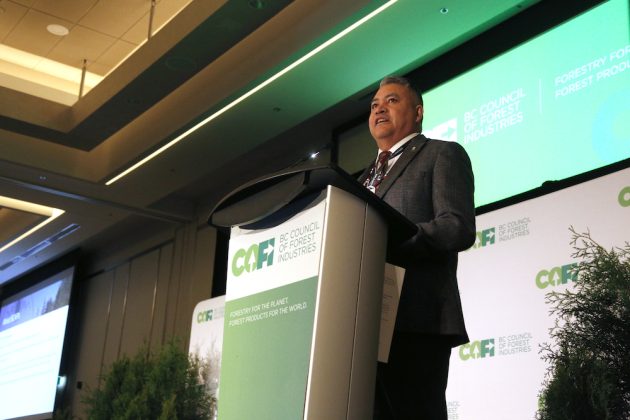
Regional Chief of the BC Assembly of First Nations, Terry Teegee addresses the crowd at the 2022 COFI convention on day two of the speaker program on April 29. Photo by Adam Kveton.
Later-on in the day, JP Gladu, the principal at Mokwateh consultancy, spoke to the value of resource development to lift communities up when it’s done in partnership with First Nations.
Addressing non-Indigenous folks who are protesting old-growth logging, he said many are taking actions on behalf of Indigenous people without the free and informed consent of First Nations communities, in the same way they fear industry does.
He also encouraged forest industry members to do the best job they can to engage with First Nations. “There is a lot of pressure on our communities to participate with you, so you better do it better than everybody else, or you’re not going to hit your stride.”
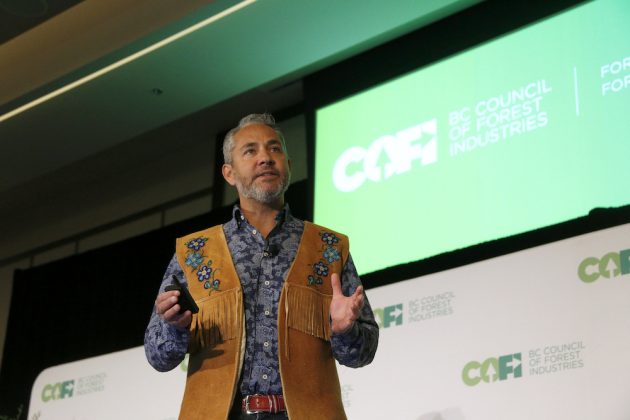
Mokwateh advisory’s principal, JP Gladu, lends perspective on Indigenous engagement and participation in resource extraction. Photo by Adam Kveton.
Securing our future
Carolyn Wilkins, advisory council member for Coalition for a Better Future, strove to provide economic analysis that is more considerate of the individual family or worker.
Wilkins urged industry leaders to support the Canadian economy by making major investments as a way to increase the country’s economic capacity, its productivity and to address upcoming challenges.
She emphasized a need to address our ageing population, an even greater push on climate change, and rapid adoption of new technologies.
“We know that a healthy and sustainable economic growth environment is critical to securing the future wellbeing of our families, our communities, of our planet,” said Wilkins. “And that’s not going to happen without a shared plan for action. Government’s just can’t do it all.”
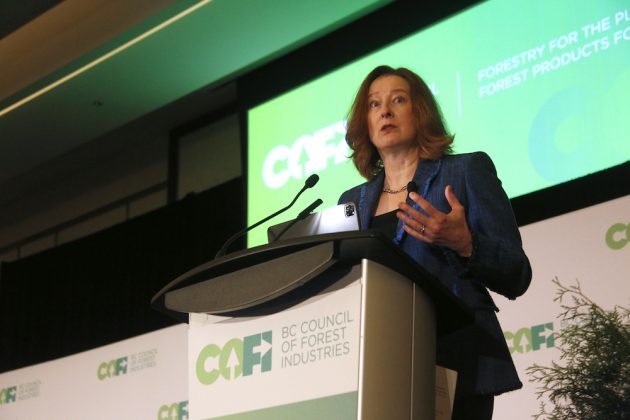
Advisory Council Member for the Coalition for a Better Future, Carolyn Wilkins, discusses what’s needed for prosperity and a strong economy going forward. Photo by Adam Kveton.
The convention’s only four-person panel saw representatives from UBC and BCIT describe some of the exciting programs they have running to prepare new workers for the forest industry, as well as United Steelworkers’ wood council chair Jeff Bromley and forester-in-training Georgina Magnus to describe what today’s young workers are looking for in a job.
Convention attendees heard that many students in these programs are tending towards natural resources conservation programs, even as universities work with industry to create useful and exciting new offerings, including a professional masters program at UBC, and mass timber buildings for BCIT that will form the basis of study for some students.
Bromley explained how young workers are looking for better work-life balance than previous generations, are less interested in overtime and more concerned about the cost of commuting to work.
Magnus agreed, adding that mentorship within a workplace is important for her and her peers, providing either formal or informal guidance. She noted, too, that it means a lot to feel that what you do not only helps yourself, but your community, and contributes towards positive change.
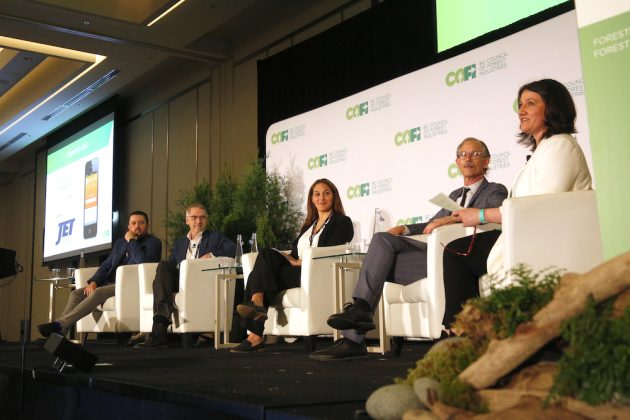
The Readying the Future Faces of Forestry panel included (from left) Jeff Bromley, chair of the wood council for United Steelworkers, Wayne Hand, Dean of the School of Construction and the Environment at BCIT, Georgina Magnus, forester in training and COFI member, Dr. Robert Kozak, Professor and Dean of the Faculty of Forestry at UBC (not visible) and moderator Michelle Ward, Senior Director of communications and government relations at Canfor. Photo by Adam Kveton.
A time for change
B.C. Premier John Horgan closed out the conference with a speech that looked to balance addressing industry while keeping in mind the individual community member. When discussing the high price of lumber, Horgan noted, “As much as it’s great to see a high price for the product, it’s also a challenge.
“Always better to have high prices than low prices,” he said, while noting how it’s raised the cost of even modest home renovations.
And while many might decry how government regulation has tempered what might otherwise be a very profitable time for the forest industry, Horgan said his government was in fact making use of these high prices.
“We have an abundance of natural resources here, and over time we’ve had peaks and valleys, and we are now in one of those peaks,” said Horgan. “But we know, all of us in this room, that the valley is not too far away. What we need to do is prepare for that transition, and I can’t think of a better time to be preparing for a transition than when we see strong prices for the commodity, [and] the opportunity to create new markets.”
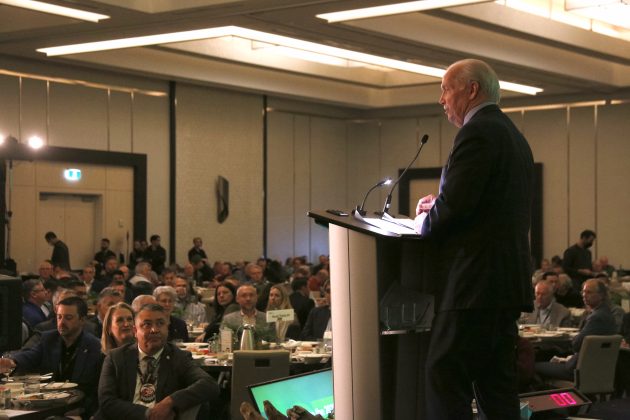
B.C. Premier John Horgan closes the 2022 COFI convention on April 29. Photo by Adam Kveton.
Horgan urged the industry not to ignore the challenges of the 21st century, nor the importance of social licence. He asked those in attendants not to think of protesters as people who consider themselves morally superior, but as people who are concerned and passionate about B.C.’s forests and climate change.
He further laid out a commitment to having working forests and protected forests, and the need to work with First Nations.
Horgan closed out his speech saying, “Let’s hope that this peak stays for a considerable period of time, and that we can take advantage of this transitional moment in British Columbia to build the forest industry that we all want to see: promoting sustainability, promoting our products around the world, and creating an area where reconciliation is valuable for everyone, not just the First Nations who have been waiting far too long for us to acknowledge and recognize that the territory that they’ve been on for millennia belongs to them, and they want to share … and if we do it together, we all succeed.”
COFI’s outgoing CEO and president, Susan Yurkovich, received a standing ovation for her fine work heading COFI, with well wishes from all for her future.
Print this page